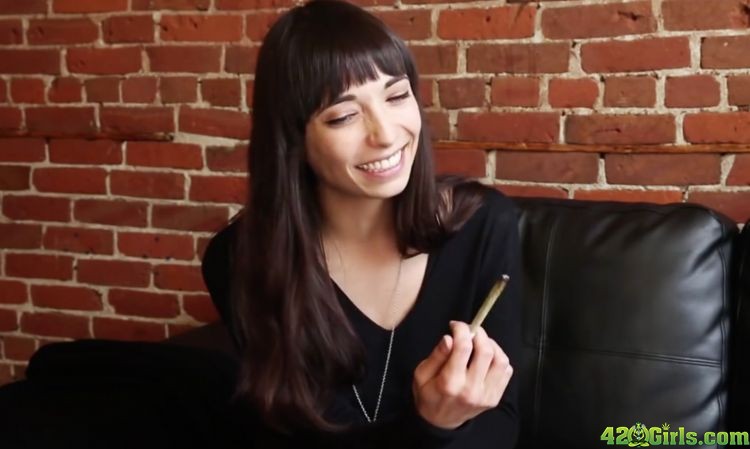It’s 4:20 on a Thursday afternoon, and Jodie Emery is teaching me how to roll one of her signature joints. “I rolled my first when I was 16, on top of a copy of Cannabis Culture magazine,” she says, grinding up a hybrid strain called Green Crack, popular for its higher concentration of sativa, a type of marijuana that gives you an energetic high. It smells mostly skunky, like all weed smells, but with a whiff of lemon. “I remember telling my friends, ‘weed smells horrible,’” Jodie says with a laugh. “They said, ‘you’ll get used to it, it’s like coffee.’”
We’re sitting in her office on the top floor of the Cannabis Culture HQ in Vancouver. The room is sparsely decorated, save for two large, uncluttered desks from which Emery, 31, and her husband, Marc, oversee their mini empire of head shops, a weed-oriented media company and an e-commerce site that sells all manner of 420 paraphernalia, from Justin Trudeau–printed rolling papers to hand-blown-glass bongs. Most recently, the Emerys have added a marijuana dispensary franchise to their business model.
Jodie gingerly sprinkles the ground-up weed into a long rolling paper, her neat, unmanicured fingers delicately massaging the herb into a tight cylinder. She shows me, Martha Stewart style, how to properly fold the filter and pack the weed in with the capped end of a Bic pen. “That’s how I roll my joint,” she says, gleefully sparking the finished product. She inhales deeply, “And then I get lipstick on it.”
Emery is one of the most notorious names in weed. Marc is a long-time marijuana activist who, in 1994, funded a court challenge to overturn a law that prohibited people from selling weed-related items and literature. His outspoken demeanour and in-your-face activism, paired with his diehard devotion to bud, earned him the nickname Canada’s Prince of Pot. In the ’90s, Marc started a mail-order cannabis seed business that would get him repeatedly arrested and eventually extradited to the U.S., where he would spend nearly five years in jail. (He was released in 2014.) He’s a 58-year-old live-free-or-die type of pothead, credited with bringing marijuana activism and legalization to national attention. But ever since his incarceration, Jodie has taken his place as the face of Cannabis Culture. And with her eloquence, media savvy, polished look and professional approach, she represents a new kind of cannabis advocate, with a mandate that’s equal parts politics and commerce.
As the Liberals stumble toward legalizing and regulating consumption of non-medical marijuana – they promise to introduce legislation by next spring – the business of buying and selling weed has become increasingly confusing. In an attempt to jump on what could be an emerging industry, people have started opening storefront dispensaries across Canada. The vast majority claim to require customers to show a prescription or doctor’s note before they can buy weed. But here’s the thing: all pot dispensaries are still operating illegally. While it’s legal for patients with prescriptions to purchase medical marijuana from licensed growers, it is not legal to buy weed from a dispensary. Meanwhile, possessing it for recreational use (that is, without a prescription), no matter how small the amount, also remains illegal. According to the letter of the law, simple possession of up to 30 grams is a misdemeanour punishable by a fine of up to $1,000 and a maximum of six months in jail (though the less you have, the less serious the punishment tends to be).
In the midst of this Wild West marketplace is Cannabis Culture, a heritage brand in an upstart industry. Marc and Jodie have been on the front lines of the battle for legalization for years. Now that change is on the horizon, Jodie’s task is to redefine what makes her relevant as a cannabis activist – and to turn her husband’s legacy into a legit business. “When Marc got out of prison, we had nothing; we were struggling to get by with a head shop and lounge,” she says. “Meanwhile, we’re watching the industry we helped create become enormously profitable. So we decided we needed to start selling marijuana like all of these dispensaries are doing.”
In April, Cannabis Culture began offering weed at their Gastown headquarters and a satellite location on Davie Street. Since then, Jodie has franchised five Cannabis Culture–branded locations in Toronto; a third store in Vancouver; one in Port Coquitlam, B.C.; and one in Peterborough, Ont., which has since shut down after two police raids. A Hamilton, Ont., location will open in late November. To set her stores apart from the competition, she did something different: Cannabis Culture dispensaries sell weed to anyone over the age of 19, regardless of whether they have a prescription.
Running recreational pot shops is most certainly against the law. Marc and Jodie have long been morally and politically opposed to marijuana prohibition in Canada, so they’re doing it anyway – and it has done wonders for refreshing the Cannabis Culture brand. When police recently raided Cannabis Culture stores in Toronto and Peterborough, the Emerys flew in to give press conferences about the injustice of marijuana prohibition and criminalization. Each time the cops try to shut her down, Jodie steps even further into the spotlight, making her the go-to source for pro-weed commentary. “The only way to change the law,” she maintains, “is to break the law.”
***
To find out what a potrepreneur’s daily grind is really like, I spent a day following Jodie around. We meet at 10 a.m. in the Emerys’ rental condo in Vancouver’s Chinatown. She greets me wearing the West Coast–girl’s uniform: an Aritzia swing dress, black pointed flats and a pendant necklace. The air is thick with the scent of weed freshly smoked (she had a few puffs before her shower to help her relax). But aside from some ornate hand-blown-glass bongs and carefully arranged crystals, this doesn’t look like a pothead’s lair. The tiny one-bedroom is minimally decorated and clean to the point of seeming sterile. “I’m a neat freak, so I’m always tidying,” Jodie says. “It really does look like this all the time.”
As proof, she offers to show me her bedroom closet. “Marc’s still sleeping, but he won’t mind,” she says. She flips on the light and there he is: the Prince of Pot, topless, mouth agape and dead asleep. Though the room is now fully illuminated and there’s a stranger poking through his wife’s collection of shifts, he doesn’t stir. The closet is, as advertised, a Marie Kondo dream.
We then start making our way to Catch 122, a café in Gastown where Jodie occasionally spends the morning sipping a latte and responding to the myriad media requests she gets on the daily. Today she’s texting with Toronto Sun reporters and The New York Times about quotes for upcoming articles. En route, Jodie gives me her stump speech about the poverty and drug issues that plague the Downtown Eastside. “I care about more than marijuana legalization,” she says. “When I consider how many people are suffering and struggling, and yet how much money is going to supposedly helping [addicts], it’s obviously not working. We need a new approach. I’d like to work on harm-reduction and even cannabis sub-sti-tution therapy.” (Some research suggests marijuana may help treat drug and alcohol addiction.)
For someone who says one of her proudest achievements was her cameo appea-r-ance in the Trailer Park Boys movie, Jodie has been particularly politically ambitious. She’s run for office five times, including two MLA bids for the B.C. Marijuana Party and two for the B.C. Green Party. Though she was defeated in her 2013 run for the Greens, she got respectable numbers at the polls, says Matt Toner, deputy leader of the party. She has testified in support of legalization in the Washington state legislature and spoken in a press conference alongside the B.C. attorney general. In 2014, she sought the nomination to run for the federal Liberals in Vancouver. The National Post’s Kelly McParland wrote that Jodie “might make a dynamite candidate,” but she lost out, some speculate, because of her ties to weed. She also applied (unsuccessfully) to be part of the federal marijuana task force, a group that will advise the government on regulation. Jodie says she thinks she was rejected for vocally opposing the way the government is going about legalization and its decision not to decriminalize weed while the country waits for regulations. “Because the Liberals had me on their side for so long, they weren’t happy when I criticized them,” she says. “Maybe they didn’t see me as a team player.”
Toner says that chutzpah is precisely what would make her a good politician. “She has a lot of the tools of a great candidate: she’s passionate; she works hard; she understands the issues,” he says. Toner recently encouraged Jodie to run again in the upcoming 2017 provincial election. “Her challenge is: can she change perception and her way of doing things from that of an outspoken advocate into someone who’s ready to be part of governance? I honestly think she’s capable of doing it.”
But perhaps her biggest coup to date is emerging from Marc’s shadow. For all his notoriety, it’s difficult to imagine her husband’s f-ck-the-man style of activism making the same political inroads. “She’s met [former prime minister] Paul Martin and [parliamentary secretary to the minister of justice] Bill Blair, and they like dealing with her,” says Marc. “Very few politicians will say no to Jodie, whereas they’ll all say no to me.”
***
When she was growing up in Kamloops, B.C., friends and family always thought Jodie would be prime minister one day. “I was a teacher’s pet and believed everything I was told,” she says. She had a happy childhood, but when she was eight, her dad committed suicide. Jodie knew he suffered from anxiety but says she still doesn’t fully understand why he killed himself. “Losing someone who loved you leaves a void,” she says. “I don’t have many people close to me because someone close to me left me.”
Jodie stayed pretty straight-edge for the early part of high school. Her mom wasn’t strict, but when her teachers told her drugs and drinking were bad, she listened. That is, until she took her first hit of weed from a gravity bong her friends had set up in her parents’ bathroom. Jodie enjoyed getting high. She liked the people who had offered her weed. Maybe her teachers had been wrong. “Then I started questioning everything I’d been told,” she says.
Jodie swiftly fell in love with weed culture and the anti-establishment ethos that went along with it. She spent the next year partying, doing coke and rebelling against everything. When she realized she had a drug problem, she asked her mom to send her to boarding school in Victoria. There she came to rely on weed as a way to avoid cocaine and cope with depression. She also began talking to Marc Emery on the Cannabis Culture chat forums, along with other activists like Dana Larsen and the late Michelle Rainey. “It was cool that this famous guy who was in the media would actually talk to people,” she says. “He inspired me.” She maintains their relationship remained platonic until she was 19.
After high school, Jodie enrolled in the University of Victoria to study liberal arts. But one month into her first year, she was sexually assaulted. She chose not to report it. “I didn’t want to have to deal with the ordeal of it,” she says. Though she tried to go back to school, she was traumatized and couldn’t focus. She moved back to Kamloops and took a job cleaning hotel rooms. She also got more involved with Marc.
“Jodie was precociously intelligent, and that attracted me,” Marc says. “When she was 19, I got her parents’ permission and asked if she wanted to come to Vancouver.” He made the case for why they should be together, “in a personal way and in a business way.” Two months later, she moved to the city. Marc then appointed her co-editor of Cannabis Culture magazine. He taught her the business, introduced her to high-profile activists and educated her about the politics surrounding marijuana prohibition. He was her mentor, boss and role model. He was also her first boyfriend. In 2005, after Marc’s businesses were raided, he proposed to Jodie from his jail cell. They were married a year later. Pot leaves decorated their wedding cake.
I know what you’re thinking: girl has serious daddy issues. I thought so, too, at first. I ask if she has ever considered a connection between her dad’s early death and her marriage to a man who is both her personal guru and old enough to be her father. “People are looking for relationships with people who are like their parents,” Jodie says. “I loved my dad so much, and he loved me so much, so maybe I’m looking for that father who disappeared. But Marc is not a replacement for my father. He is not like my dad at all. That’s just what people say about women who marry older guys.”
Others have called her a trophy wife. And at surface level, there may seem to be a Svengali vibe to their relationship, but Jodie has turned the whole mentor-muse trope on its head. “The student has now become the master,” she laughs. It’s a stoner laugh-, with hints of Spicoli, Sean Penn’s surfer character from Fast Times at Ridgemont High. But it’s charming. Contagious. “I prefer to keep [Marc] out of the business. He struggled with that, but I built what we’ve got now.”
For his part, while Marc was confident Jodie could handle Cannabis Culture when he was in prison, her ultimate takeover has been challenging for their relationship. After he was released, he says, “I wanted my business back. We argued about this for six months, but she won me over.”
***
After Jodie and I finish our coffee, I tag along to what is arguably the most important part of her workday: a media interview. This one is with Drex, a bearded and boisterous talk-radio host on Vancouver’s CKNW.
“We need places for people to consume cannabis,” Jodie says during a discussion about a recent statement by police that they will turn people away from a local concert if they’re caught carrying drugs, including weed. “We’ve got our vapour lounges, so you can come to our place and smoke,” she adds. I’m impressed by the way she slides in a promo for her business while managing to portray just the right amount of outrage about the issue at hand.
Jodie’s ability to give good sound bites is just one reason the media chase her. She’s also strikingly beautiful and not afraid to use her looks to her advantage. Her creed: “If a pretty face can sell makeup, it can sell a message.” In the past, she’s appeared as a topless centrefold for Cannabis Culture magazine. She also posed in a white string bikini in a promotional poster for Ron Paul, a U.S. Libertarian candidate in the 2008 Republican presidential primaries (the poster’s slogan: “Liberty turns me on!”). “If somebody thinks you’re attractive, then maybe they will listen to what you have to say,” she says. “I’ve had people say they find my activism sexy.”
The press isn’t always favourable, however. A month after our interview, The Globe and Mail ran an investigation into contaminants in weed reporters bought at dispensaries across Toronto. One-third of the samples would not have passed Health Canada’s medical marijuana safety standards. Weed purchased at Cannabis Culture tested positive for “bacteria exceeding Health Canada’s allowable limit” and was the only sample “to exceed Health Canada’s limit for total yeasts and moulds.” The inspections were run at a third-party lab that was kept anonymous because it is illegal for everyone but licensed growers to test marijuana, which means dispensaries don’t have any way to assess their supply.
“It’s a lot of fear-mongering,” Jodie says when I call to follow up about the Globe article. “They’re trying to blame dispensaries for any problems with quality when that blame falls on the government and prohibition.” The reported lack of quality control doesn’t seem to be stopping customers. According to Jodie’s estimations, the franchises are pulling in $5,000 to $10,000 every day. While that may seem like a lot of cash, running an illegal weed dispensary is actually quite expensive. As a condition of the franchise agreement, store owners are required to cover legal costs and bail for any arrested employees. As well, sometimes landlords extort higher rents because of the increased risk they’re running to house an unlawful business. On the Emerys’ end, they buy the weed from growers (some licensed, some not), cover sales and payroll tax, distribute the weed to their franchisees and then receive a percentage of the profits. That amount is steadily increasing as the business grows. “I think it’s a great sign that people love our brand,” Jodie says. “We’ve just given all of our employees a dollar-per-hour raise.”
After the CKNW interview, we head over to the Davie Street franchise. This location encapsulates everything Jodie wants other Cannabis Culture franchises to be: a modern one-stop shop for buying and consuming weed. There’s a head shop on the ground floor; upstairs is the smoking lounge, which looks like an undergrad common room. By contrast, the adjacent dispensary is all white walls and clean lines. Apothecary jars full of weed sit behind glass counters. Each strain is labelled with notes about its balance of sativa (the energizer) and indica (which gives you that mellow, stoner feeling), and percentage of THC (the chemical that makes you high) and CBD (a substance purported to have medical benefits). Customers order from the “budtender,” pay in cash and either smoke in the lounge or take it to go. Prices range from $5 to $12 per gram. Vancouver rates tend to be lower than those in Toronto, but they’re overall still slightly higher than what you’d pay your dealer.
Jodie greets the hipsters and punks who work the retail counters; they all seem to adore her. Then again, who wouldn’t love a gig that lets you blaze at the office? It should be noted that Jodie also conducts business while baked. “I almost always carry a joint around with me,” she says, pulling a blunt out of her black Marc by Marc Jacobs hobo as proof. “I can get stressed and depressed, but cannabis helps me [cope].”
Do you even get high anymore? I ask.
She does. “Yesterday we smoked after a meeting, and we were all just laughing hysterically,” she says. “It’s like having a glass of wine.” And while she says she would never sip a pre-shower glass of Chardonnay, she insists that for her, being a little bit high isn’t the same as being drunk. “When I say weed is like wine, I mean it’s a substance people use to relax,” she says. “But weed is less intoxicating. When I drink wine, I notice a negative impact.” Not so after a few tokes.
I get it. We’re all adults here. Everyone deserves a little something to power down after a stressful day. But one question keeps niggling at me: why would someone devote her life so thoroughly to weed? “For me, it’s a civil liberties issue,” she explains. “It’s not about the right to smoke pot; it’s about the right not to get arrested for making that choice.” She also openly relishes the fact that as a cannabis activist, she can be a big fish in the small pond of people willing to champion this controversial cause. Then there’s the fact that there’s a lot of money to be made. The Canadian market could, reportedly, be worth an estimated $5 billion to $7 billion annually. Jodie is excited to take her cut, citing Apple, Starbucks and Beats by Dre as brands she’d like to model her business on. “I want to be Dr. Dre,” she says. “The Dr. Dre of Weed.”
News Moderator: Katelyn Baker [URL=”http://www.420magazine.com”]420 MAGAZINE ®[/URL]
Full Article: [URL=”http://www.flare.com/culture/meet-cannabis-cultures-jodie-emery-activist-entrepreneur-pothead/”]Meet Cannabis Culture’s Jodie Emery – Activist, Entrepreneur, Pothead[/URL]
Author: Jennifer Goldberg
Contact: [URL=”http://www.flare.com/contact-us/”]FLARE[/URL]
Photo Credit: Ian Lanterman
Website: [URL=”http://www.flare.com/”]FLARE[/URL]











